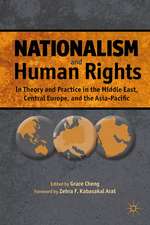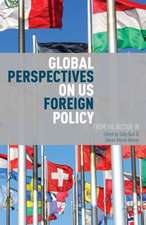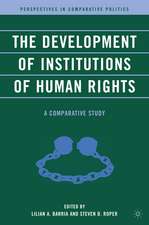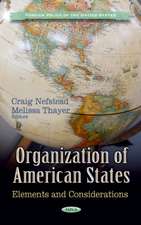Theory and Metatheory in International Relations: Concepts and Contending Accounts
Autor F. Chernoffen Limba Engleză Paperback – 7 noi 2007
Preț: 582.12 lei
Preț vechi: 684.84 lei
-15% Nou
Puncte Express: 873
Preț estimativ în valută:
111.42€ • 121.07$ • 93.66£
111.42€ • 121.07$ • 93.66£
Carte tipărită la comandă
Livrare economică 21 aprilie-05 mai
Preluare comenzi: 021 569.72.76
Specificații
ISBN-13: 9781403974556
ISBN-10: 1403974551
Pagini: 240
Ilustrații: X, 223 p.
Dimensiuni: 152 x 229 x 12 mm
Greutate: 0.37 kg
Ediția:2007
Editura: Palgrave Macmillan US
Colecția Palgrave Macmillan
Locul publicării:New York, United States
ISBN-10: 1403974551
Pagini: 240
Ilustrații: X, 223 p.
Dimensiuni: 152 x 229 x 12 mm
Greutate: 0.37 kg
Ediția:2007
Editura: Palgrave Macmillan US
Colecția Palgrave Macmillan
Locul publicării:New York, United States
Cuprins
Introduction Three Policy Dilemmas: Iraq, North Korea, Russia and China Policy Decisions and Theories of International Relations International Relations and Scientific Criteria for Choosing a Theory Critical Theories and the Attack on the Scientific Study of International Relations Conclusion
Recenzii
"This book is a rare attempt to practice what so often is preached in the study of International Relations. The study takes major debates in the philosophy of inquiry and abstract battles over theory and shows why they matter in the most practical of all contexts. Historically important examples of US decision-making are used to show how and why results could be improved if those in charge in the real world thought more deeply about the foundations of their choices in theory and even meta-theory. The book is a fascinating 'read' because of the way in which the decision to invade Iraq, challenges from North Korea's nuclear program and the rise of China as a world power are integrated into a sophisticated treatment of theoretical controversies in the field of International Relations. This book will interest academics in that discipline as well as those in the more applied world of foreign policy decision-making. I recommend the work with great enthusiasm."
- Patrick James, Director, Center for International Studies, University of Southern California
"Fred Chernoff provides a seminal exploration of questions central to the study of international politics. How do we justify our claims to provide an understanding of international relations? On what basis can we make recommendations to policy makers? Chernoff's answer is rooted in a rich and compelling defense of conventionalism, one that takes seriously the special problems confronted by social scientists andscholars of world politics. He also provides a concise, accessible, and sophisticated overview of major debates in the philosophies of science and social science. All scholars and students of international relations should read this book, as should anyone interested in the philosophy of social science." - Daniel H. Nexon, Department of Government and School of Foreign Service, Georgetown University'Fred Chernoff has written a sorely-needed text that goes a long way towards filling in the gaps in most IR scholars' understanding of the philosophical issues implicated in theory choice. The book both introduces readers to some key issues in the philosophy of science and illustrates the concrete implications of thosephilosophical debates for the practice of IR scholarship. Taking as his starting-point the idea that IR scholarship should be about providing policymakers with reliable guidelines for action, Chernoff incisively discusses how a variety of naturalist and anti-naturalist perspectives either contribute to or hinder that goal. The book should put to rest once and for all the misconception that meta-theory is irrelevant to the production of empirical knowledge about world politics.'
- Patrick Thaddeus Jackson, Associate Professor of International Relations in the School of International Service, American University and author ofCivilizing the Enemy(2007)
- Patrick James, Director, Center for International Studies, University of Southern California
"Fred Chernoff provides a seminal exploration of questions central to the study of international politics. How do we justify our claims to provide an understanding of international relations? On what basis can we make recommendations to policy makers? Chernoff's answer is rooted in a rich and compelling defense of conventionalism, one that takes seriously the special problems confronted by social scientists andscholars of world politics. He also provides a concise, accessible, and sophisticated overview of major debates in the philosophies of science and social science. All scholars and students of international relations should read this book, as should anyone interested in the philosophy of social science." - Daniel H. Nexon, Department of Government and School of Foreign Service, Georgetown University'Fred Chernoff has written a sorely-needed text that goes a long way towards filling in the gaps in most IR scholars' understanding of the philosophical issues implicated in theory choice. The book both introduces readers to some key issues in the philosophy of science and illustrates the concrete implications of thosephilosophical debates for the practice of IR scholarship. Taking as his starting-point the idea that IR scholarship should be about providing policymakers with reliable guidelines for action, Chernoff incisively discusses how a variety of naturalist and anti-naturalist perspectives either contribute to or hinder that goal. The book should put to rest once and for all the misconception that meta-theory is irrelevant to the production of empirical knowledge about world politics.'
- Patrick Thaddeus Jackson, Associate Professor of International Relations in the School of International Service, American University and author ofCivilizing the Enemy(2007)
Notă biografică
FRED CHERNOFF is Professor of Political Science, Director of the International Relations Program, Colgate University, USA.















